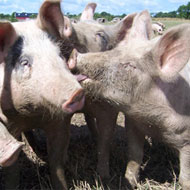Report published on Exercise Walnut

The exercise was organised by the AHVLA to test contingency plans for an outbreak of CSF.
A report has been published following Exercise Walnut - an activity designed to simulate a national scale outbreak of classical swine fever (CSF).
Organised by the AHVLA, the idea behind the exercise was to test the government's contingency plans and policy for the control of an outbreak of the disease.
A live exercise took place across two days in June 2013 and following this the agency has identified a number of lessons and actions to be taken.
The AHVLA says Exercise Walnut offered reassurance that the UK could respond effectively to an outbreak of CSF.
While feedback from participants was positive, the government says it will build upon this by acting upon the lessons laid out in the report.
This will include improving communication, data sharing and management, as well as looking into staff training.
One factor identified was a lack of trained, experienced field staff for a large scale pig disease outbreak.
The last significant outbreak of CSF was more than 10 years ago. Combined with staff reductions and the fact that AHVLA have little day-to-day contact with pig keepers, there are concerns about a loss of practical experience within the field.
A representative from the Pig Veterinary Society warned that in the event of an outbreak, large numbers of veterinary surgeons with pig experience could not be expected to be readily available.
The agency says it will explore some options to improve this, including staff training in pig handling and bleeding.
CSF is a notifiable disease mostly spread by direct contact between healthy and infected pigs, or contact with contaminated feed, bedding, equipment, vehicles or waste, for example.
Clinical signs are very similar to African swine fever and the two can only be differentiated by diagnostic tests. While CSF does not affect humans it can spread rapidly through pig herds.
The virus was eradicated from Britain in 1966 and occasional outbreaks since have been contained and eradicated.



 The Veterinary Medicines Directorate (VMD) is inviting applications from veterinary students to attend a one-week extramural studies (EMS) placement in July 2026.
The Veterinary Medicines Directorate (VMD) is inviting applications from veterinary students to attend a one-week extramural studies (EMS) placement in July 2026.